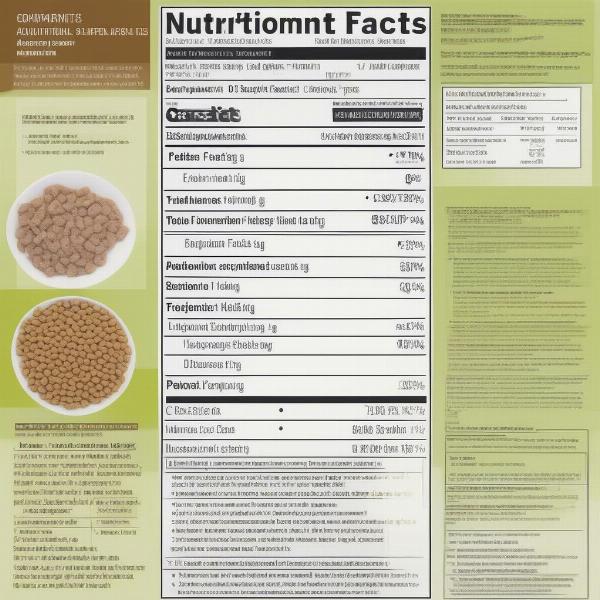Tux dog food isn’t a widely recognized brand name like some others on the market. However, understanding the principles of good dog nutrition is crucial regardless of the specific brand you choose. This guide will equip you with the knowledge to assess any dog food, including lesser-known brands like “tux dog food,” and determine if it meets your dog’s nutritional needs. We’ll explore key ingredients, life stage requirements, and potential dietary concerns to ensure your furry friend receives the best possible nutrition.
Decoding Dog Food Labels: What to Look For
Understanding dog food labels can be daunting. Look for the guaranteed analysis, which lists minimum percentages of protein, fat, fiber, and moisture. Ingredients are listed in descending order by weight. For a product potentially labeled “tux dog food,” or any unfamiliar brand, carefully examine these components. Prioritize whole meat sources as the first ingredient, followed by wholesome grains, fruits, and vegetables. Avoid artificial colors, flavors, and preservatives.
 Analyzing Dog Food Labels
Analyzing Dog Food Labels
Life Stage Nutrition: Puppy, Adult, and Senior
A dog’s dietary needs change throughout its life. Puppies require higher protein and fat for growth, while senior dogs benefit from lower calorie, easily digestible foods. If “tux dog food” targets a specific life stage, ensure the formulation aligns with those requirements. For example, puppy food should support healthy bone development, while senior formulas may address joint health.
Dietary Concerns: Allergies and Sensitivities
Many dogs suffer from food allergies or sensitivities. Common culprits include chicken, beef, wheat, and corn. If your dog experiences digestive issues or skin problems, consider a limited ingredient diet or a hypoallergenic formula. If “tux dog food” claims to address such concerns, carefully review the ingredients and consult with your veterinarian.
The Importance of Balanced Nutrition: Beyond “Tux Dog Food”
Regardless of the brand name, balanced nutrition is paramount. A complete and balanced diet should provide all the essential nutrients your dog needs to thrive. Look for the Association of American Feed Control Officials (AAFCO) statement on the label, which confirms the food meets nutritional standards.
Feeding Guidelines and Portion Control
Overfeeding can lead to obesity and other health problems. Follow the feeding guidelines on the package, adjusting portions based on your dog’s age, activity level, and overall health. Consult with your vet to determine the ideal caloric intake for your dog.
Is “Tux Dog Food” the Right Choice?
While “tux dog food” may not be a readily available brand, the principles discussed above apply to any dog food you choose. By focusing on quality ingredients, life stage requirements, and potential dietary concerns, you can make an informed decision about the best diet for your furry companion.
Conclusion: Prioritizing Your Dog’s Nutritional Needs
Choosing the right dog food is crucial for your pet’s health and well-being. Whether you’re considering “tux dog food” or another brand, always prioritize whole ingredients, balanced nutrition, and your dog’s specific needs. Consult with your veterinarian for personalized guidance.
FAQ:
- What are the key ingredients to look for in dog food? Prioritize whole meat sources, wholesome grains, fruits, and vegetables.
- How do I know if my dog has a food allergy? Common signs include digestive issues, skin problems, and excessive scratching.
- How much should I feed my dog? Follow the feeding guidelines on the package and consult with your vet.
- What is AAFCO? The Association of American Feed Control Officials sets nutritional standards for pet food.
- Is “tux dog food” a good brand? While not a common brand, assess any dog food based on ingredients and nutritional balance.
- How do I choose the right food for my puppy/senior dog? Select formulas specifically designed for their life stage and nutritional needs.
- What should I do if I suspect my dog has a food allergy? Consult with your veterinarian and consider a limited ingredient or hypoallergenic diet.
Related Articles on ILM Dog:
About ILM Dog: ILM Dog is your trusted resource for expert advice on dog care and nutrition. We offer comprehensive guides on breed selection, health and wellness, training, and much more. From puppyhood to senior years, we help you provide the best possible care for your canine companion. For personalized advice, contact us at [email protected] or call +44 20-3965-8624.